
Only Amiga makes it possible.
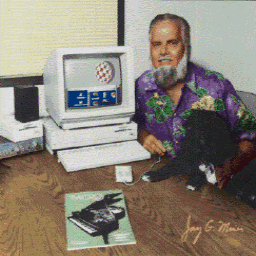 Jay Miner Interview Pasadena, September 1992.
Jay Miner Interview Pasadena, September 1992.
"The story starts in the early 1980`s with a company not originally called Amiga, but Hi Toro, which was started by Dave Morris, our president, but before all that I used to work with Atari and I wanted to do a 68000 machine with them. We had just finished the Atari 800 box and they were not about to spend another umpteen dollars on research for a 16-bit machine and the processor chip itself cost $100 apiece. RAM was also real expensive and you need twice as much. They couldn't see the writing on the wall and they just said "No", so I quit!".
/ Jay Miner, father of the Amiga.
 AmiNet is the largest file archive available on the net for
any platform and is dedicated to the Amiga!
It's contents are mirrored all over the world, and some of the
servers supporting WWW are listed here.
AmiNet is the largest file archive available on the net for
any platform and is dedicated to the Amiga!
It's contents are mirrored all over the world, and some of the
servers supporting WWW are listed here.
| Country | Archive | Size |
|---|---|---|
| USA (MO) | ftp.wustl.edu | Main Aminet site |
| USA (WI) | ftp.netnet.net | Complete mirror, full WWW support |
| Switzerland | www.eunet.ch | 4000 files mirror, full WWW support |
| UK | src.doc.ic.ac.uk | Complete mirror |
| Germany | ftp.germany.aminet.org | Complete mirror, full WWW support |
| Germany | ftp.uni-paderborn.de | Complete mirror, full WWW support |
| Germany | ftp.uni-erlangen.de | 6000 files mirror, custom WWW |
| Germany | tu-muenchen.de | Selective mirror, custom WWW |
| Germany | uni-hamburg.de | WWW frontend to all Aminet sites |
| Italy | ftp.unina.it | Complete mirror, full WWW support |
| Australia | www.livewire.com.au | Complete mirror, full WWW support |
 MUI (Magic User Interface) is an object oriented system to create and maintain graphical user
interfaces. Programmers save a great amount of work and benefit from
MUI's powerful object collection, users get the possibility to customize
nearly every pixel of an applications look according to their personal
taste. During the last years, MUI has established itself as a standard
for graphical user interfaces on the Amiga. Since its first
release in 1993, lots of experienced programmers have contributed to
the success by releasing hundreds of MUI based applications.
MUI (Magic User Interface) is an object oriented system to create and maintain graphical user
interfaces. Programmers save a great amount of work and benefit from
MUI's powerful object collection, users get the possibility to customize
nearly every pixel of an applications look according to their personal
taste. During the last years, MUI has established itself as a standard
for graphical user interfaces on the Amiga. Since its first
release in 1993, lots of experienced programmers have contributed to
the success by releasing hundreds of MUI based applications.
MUI's main goal is to provide your Amiga system with a flexibility and configurability unmatched by any other computer platform. Follow the links to learn more about the numerous possibilities that MUI has to offer. If you like what you see, please consider to register MUI to help the author develop future versions and make the Amiga stay the best-looking machine on earth.
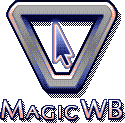 MagicWB is a full replacement for the Graphic User
Interface of the Workbench and has become the standard visual interface on
the Amiga. Over the last years MagicWB has received various merits and a
high response from Amiga magazines and users worldwide
proclaiming it "a must for all Amiga users". Since its debut in 1993, dozens of other PD
authors have supported the spirit of MagicWB through their contribution of
hundreds of 3rd-party packages and extensions to MagicWB and also by adopting its new style to their programs.
MagicWB is a full replacement for the Graphic User
Interface of the Workbench and has become the standard visual interface on
the Amiga. Over the last years MagicWB has received various merits and a
high response from Amiga magazines and users worldwide
proclaiming it "a must for all Amiga users". Since its debut in 1993, dozens of other PD
authors have supported the spirit of MagicWB through their contribution of
hundreds of 3rd-party packages and extensions to MagicWB and also by adopting its new style to their programs.
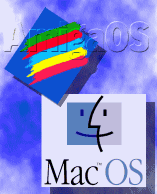 Shapeshifter is a multitasking Macintosh II emulator for the Amiga
and DraCo. It allows programs written for Apple Macintosh computers to run
on the Amiga/DraCo without hardware modifications or expansions. The
emulation runs as a normal task under AmigaOS, so that Amiga and Macintosh
programs can be used concurrently. With ShapeShifter you can combine the
flexibility of the Amiga with the power of Macintosh software!
Some of the emulation's features are support for one or two monitors,
CD-ROM drives are supported (you can use an ATAPI drive),
SCSI interface in the Amiga can be accessed from the Macintosh,
access to Ethernet networks with AppleTalk/MacTCP/MacIPX,
multichannel sound output,
texts can be exchanged via the Macintosh and Amiga clipboard
and an AmigaDOS handler exists to access the files on Macintosh volumes from every Amiga program.
Shapeshifter is a multitasking Macintosh II emulator for the Amiga
and DraCo. It allows programs written for Apple Macintosh computers to run
on the Amiga/DraCo without hardware modifications or expansions. The
emulation runs as a normal task under AmigaOS, so that Amiga and Macintosh
programs can be used concurrently. With ShapeShifter you can combine the
flexibility of the Amiga with the power of Macintosh software!
Some of the emulation's features are support for one or two monitors,
CD-ROM drives are supported (you can use an ATAPI drive),
SCSI interface in the Amiga can be accessed from the Macintosh,
access to Ethernet networks with AppleTalk/MacTCP/MacIPX,
multichannel sound output,
texts can be exchanged via the Macintosh and Amiga clipboard
and an AmigaDOS handler exists to access the files on Macintosh volumes from every Amiga program.
 IBrowse is the most advanced web browser for the Amiga. It supports
more world wide web features than any other Amiga browser, including
frames, cookies and SSL, which means IBrowse users have proper access to more
web sites than users of lesser browsers. This is why all the pundits agree
that, with its famous uncluttered and easy-to-use interface, plus regular
updates and upgrades, IBrowse has to be the
only choice for the Amiga surfer who wants to go places in style.
IBrowse is the most advanced web browser for the Amiga. It supports
more world wide web features than any other Amiga browser, including
frames, cookies and SSL, which means IBrowse users have proper access to more
web sites than users of lesser browsers. This is why all the pundits agree
that, with its famous uncluttered and easy-to-use interface, plus regular
updates and upgrades, IBrowse has to be the
only choice for the Amiga surfer who wants to go places in style.
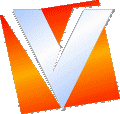 Vaporware Software have some great Amiga products of which the
Internet applications really stands out.
Vaporware Software have some great Amiga products of which the
Internet applications really stands out.
Voyager-NG broke new ground earlier this year when it became the first Amiga browser available on the market to support frames, and also the first Amiga browser to support SSL, Secure Socket Layer transactions. VoyagerNG is now also the first browser on the Amiga to feature support for the emerging HTTP/1.1 standard. This allows the browser to negotiate chunked transfers, resume aborted downloads and a range of other features. HTTP/1.1 compliant servers are only beginning to spread over the web though, and the true benefits of this will be known in time.
AmFTP is the brand new GUI based FTP utility for your Amiga. It is much more than yet another simple FTP client. AmFTP is your control desk for finding and retrieving files from the Internet as fast and as easy as possible. Since it's initial release, AmFTP soon has become the number one FTP application for the Amiga, with features like Full ADT (Aminet Download Tool), Archie, asynchronous transfers for maximum efficiency and throughput, directory cache for fast browsing, automatically uses the auto-compress feature of wu-ftpd and other FTP servers, batch download facility and of course full ARexx support.
AmIRC is the number one AmigaOS IRC client. It's key features are ultra fast text output and scrolling, builtin high speed DCC drivers for SEND and MOVE, highly optimized with asynchronous file I/O and threaded network handling, supports Drag&Drop sending of files, supports the "mIRC for Windows" DCC RESUME extension, tranparent implementation of DCC CHAT (all /MSGs are automatically routed via DCC CHAT if applicable, to save runtime and reduce IRC load.), full support of the "Undernet" IRC extensions (both reply codes and additional IRC commands), full support of the DALNet IRC extensions including 30 character nicknames. and of course full ARexx support.
AmTelnet is a recent VaporWare production by Mathias Mischler (author of AmFTP). It allows you to easily make telnet connections to machines all over the internet with an attractive, easy to use GUI.
AmigaNCP is a software package to link an AmigaOS to a Psion-S3/S3a. Psion's fine palmtop computer series, namely the S3 and S3a, contain an even finer operating system, whose neat features cover a full fledged peer-to-peer networking software using a protocol called NCP. Using NCP, you can link together two Psion computers or a Psion and a different, perhaps stationary machine and happily exchange data on your behalf. NCP services include, but are not limited to, accessing files on the remote machines as if they were on yours, in both directions.
 YAM (Yet Another Mailer) is a MIME-compliant Internet mailer for the for the
Amiga with built-in POP3 and SMTP clients.
Apart from the basic functions; read, write, delete, reply and forward mail,
it has features such as address book supporting groups and user lists,
write or reply your messages offline,
built-in support for UUencode and MIME to send and receive binary files,
up to 32 filters to automatically process new messages
and support for ARexx, which allows other programs (e.g. WWW browsers) to control YAM.
YAM (Yet Another Mailer) is a MIME-compliant Internet mailer for the for the
Amiga with built-in POP3 and SMTP clients.
Apart from the basic functions; read, write, delete, reply and forward mail,
it has features such as address book supporting groups and user lists,
write or reply your messages offline,
built-in support for UUencode and MIME to send and receive binary files,
up to 32 filters to automatically process new messages
and support for ARexx, which allows other programs (e.g. WWW browsers) to control YAM.
 AmiWin is an X11R6 ("X-Window-System") package for AmigaOS. It is in
some ways similar to "DaggeX" by Kari Mattinen or the "GfxBase-X11R4"
implementation by Dale Luck.
AmiWin is an X11R6 ("X-Window-System") package for AmigaOS. It is in
some ways similar to "DaggeX" by Kari Mattinen or the "GfxBase-X11R4"
implementation by Dale Luck.
AmiWin allows you to use your Amiga as an X11 terminal. This means you can for example run programs like NetScape on a Un*x machine connected to your Amiga, but redirect the display and GUI to your Amiga. It is also possible to port X11 programs to AmiWin and run them directly on your Amiga.
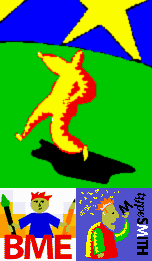 SoftLogik was one of the first companies to develop a desktop publishing
program. The first version of PageStream, known at the time as Publishing
Partner, was released in 1986 for Atari ST computers. Personal Publishing
magazine reviewed it and called it a "knockout program".
SoftLogik was one of the first companies to develop a desktop publishing
program. The first version of PageStream, known at the time as Publishing
Partner, was released in 1986 for Atari ST computers. Personal Publishing
magazine reviewed it and called it a "knockout program".
Publishing Partner grew into PageStream and was released for Amiga computers in 1989. PageStream went on to win every major Amiga and Atari award.
PageStream can, like other publishing programs, be used to set type, draw
objects, and place graphics. It has extremely precise typography, professional
printing, and a rich assortment of features. PageStream differs from other
DTP programs in that it has most of the drawing features of an illustration
program, some unique features that Quark and Adobe haven't thought up yet,
a lower price, and most importantly, an outstanding interface.
PageStream3 is a full-featured desktop publishing program. It is suitable
for all levels of publishing, from simple newsletters to color advertisements
to technical books. With PageStream you can create letters, colorful schoolwork,
presentations, business cards and any other type of document. Thousands
of people have been using PageStream for years to realize their dreams,
from rubber stamps to airline livery!
BME is a junior image processor which certainly won't tempt anybody away from using any professional image processing program, but if you don't own one, this program, which comes free with PageStream3, will let you view, convert and manipulate pictures! Even if you own a professional image processing program, BME is so much small that it's often faster for viewing and converting pictures. Some of the features are zoom in and out from 3.125% to 3200%, clipboard for selected areas with unlimited undo (limited only by memory), and ability to crop or clone a selected area. It supports TIFF, PICT, GIF, PCX, BMP, MacPaint and IFF ILBM pictures. It also has effect filters such as brightness, contrast, emboss, negative, pixelize, reduce noise, sharpen and tiles.
TypeSmith is a need if you work with fonts. It allows you to convert between
PostScript, TrueType, Compugraphic, Intellifont and SoftLogik format fonts.
Now your fonts can be used with virtually any Amiga program, including PageStream,
Wordworth, Final Writer, Professional Page, Personal Paint, Brilliance,
Deluxe Paint, Lightwave, Scala and many more! TypeSmith can load a font
and save it in any other format, and it can convert an entire directory
of fonts at once.
TypeSmith's toolbox allows you to draw new fonts from scratch and to copy
and paste characters between fonts. You can generate bitmap fonts from character
outlines and autotrace scanned pictures. Print previews of your fonts, add
hints for a professional look, set kerning pairs to improve the character
spacing, and much more! TypeSmith 2.5 should be part of every Amiga user's
software library.
 phase 5 digital products is a dedicated hardware developer
and manufacturer of Amiga add-ons, and has become a leading vendor of CPU
Accelerators, Graphic Expansion Boards and SCSI Controllers for the Amiga
platform, who has shipped some 60,000 products into this market since late
1995. Leading products and innovations such as the first 68060 Accelerators
for Amiga computers, the first 32-bit Zorro-III DMA SCSI controllers for
A3000/A4000 systems, the succesful Blizzard series of inexpensive high-quality
accelerators for A1200 and A2000 systems, or the powerful CyberVision Graphic
card family and the CyberGraphX V3 RTG standard define the milestones of
development for which the company received 20 Product of the Year Awards
by leading magazines since 1992. With new development projects integrating
the PowerPC RISC processor into accelerator boards for Amiga computers as
well as Apple Macintosh systems, and the new ASE (Advanced Silicon Engineering)
Group which is assigned to ASIC research and development phase 5 digital
products underscores it's company profile as a highly innovative company,
which is based on the business philosophy that continous product innovation
is the key for a succesful future, and that a market for alternative technology
will continue to exist.
phase 5 digital products is a dedicated hardware developer
and manufacturer of Amiga add-ons, and has become a leading vendor of CPU
Accelerators, Graphic Expansion Boards and SCSI Controllers for the Amiga
platform, who has shipped some 60,000 products into this market since late
1995. Leading products and innovations such as the first 68060 Accelerators
for Amiga computers, the first 32-bit Zorro-III DMA SCSI controllers for
A3000/A4000 systems, the succesful Blizzard series of inexpensive high-quality
accelerators for A1200 and A2000 systems, or the powerful CyberVision Graphic
card family and the CyberGraphX V3 RTG standard define the milestones of
development for which the company received 20 Product of the Year Awards
by leading magazines since 1992. With new development projects integrating
the PowerPC RISC processor into accelerator boards for Amiga computers as
well as Apple Macintosh systems, and the new ASE (Advanced Silicon Engineering)
Group which is assigned to ASIC research and development phase 5 digital
products underscores it's company profile as a highly innovative company,
which is based on the business philosophy that continous product innovation
is the key for a succesful future, and that a market for alternative technology
will continue to exist.
phase 5 digital products remains to be dedicated to the Amiga computer and the Amiga community, with the goal to support the active user base with powerful and innovative products. As a major breakthrough phase 5 digital products is going to introduce a new series of advanced PowerPC based accelerators, which operate as dual-processor systems in order to offer breath-taking performance enhancements combined with a 100% compatibility to the existing OS and applications. With a strong support for software developers worldwide by providing development systems and tools phase 5 digital products actively supports the introducion of a new software generation that can make use of the significant performance increases which are possible with the PowerUp Accelerators.
 Amiga Web Directory is the most comprehensive guide to Amiga resources on the Web. Atleast according to them selves...
Amiga Web Directory is the most comprehensive guide to Amiga resources on the Web. Atleast according to them selves...
 Amiga Format is the world's biggest-selling Amiga magazine. Bla, bla, bla...
Amiga Format is the world's biggest-selling Amiga magazine. Bla, bla, bla...
 Amigaˇinfo is the best Swedish Amiga magazine. Bla, bla, bla...
Amigaˇinfo is the best Swedish Amiga magazine. Bla, bla, bla...
This page reflects my opinion of what makes the Amiga so great...
The pictures and the text on this page are ripped and modified to suit my preferences! This is done without any approval from the artists or authors, hence this page violates quite some copyright rules. However, the pictures are often links to the source of the information, and is there for the benefit of the product/company in particular, and the Amiga in general.
/Lars Malmborg
 |
|

| This page was designed on an Amiga and is optimized for IBrowse. |
